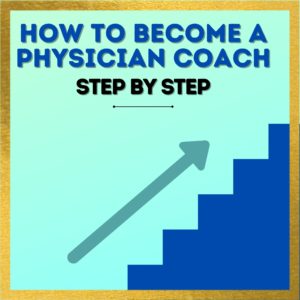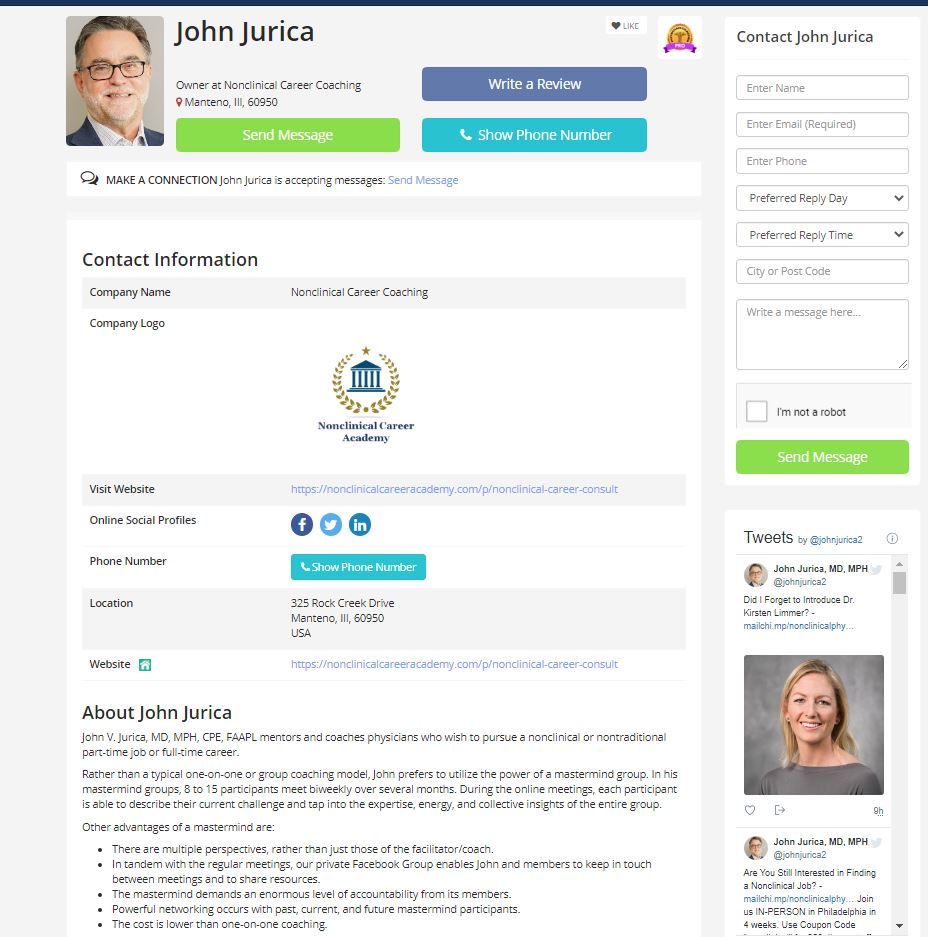So You Want to Be a Physician Coach?
But you think the whole process might be too convoluted or complicated?
When our company launched PhysicianCoaches.com we got a lot of buzz.
So it was understandable that there was a lot of interest of people wanting to become coaches themselves.
As physicians, let’s face it, we can often complicate things.
Having worked with coaches, hiring coaches, and being a coach myself, I’m going to break it down. into ten easy steps.
But before we do that… there’s one IMPORTANT THING.
If you’re currently working as a physician, be sure your current workplace allows you to freelance and start your own side business.
Even if the are you are considering is completely nonclinical. I’ve seen too many doctors who had to shut down their coaching practice because their employer won’t let them.
Re-read your contract and be sure to talk to your HR department.
And ONE MORE THING, remember that starting a business isn’t guaranteed success.
Because as a physician coach, you are running your own business.
You are an entrepreneur.
You need to be able to understand that hustling means you’ll need to market yourself.
Some people aren’t very comfortable doing that.
Remember, there is risk anytime you start a business.
With that of the way, let’s talk Step-By-Step how YOU can become a physician coach.
Here we go!!!
Step #1: Decide on Your Coaching Niche.
What are you good at?
What knowledge do you have?
What specialized expertise that you could share that would directly impact somebody’s life?
If you don’t know, ask your friends or people who have helped you already.
How has their life benefited from what you know?
Now if you haven’t, don’t worry, we’ll cover that soon.
And is it something that people would want to pay for?
Generally, people pay for things that improve in one of these 3 areas:
Health, Wealth, and Relationships.
Health is easy to understand. You’ve been doing that your entire career.
Wealth is about making money. It could be anything from investing advice to helping someone pass their medical boards.
Relationships covers everything from improving their marriage to finding their soul mate.
As an example, one of my students makes money by buying houses and converting them into short-term rentals (aka AirBNB)
She makes steady passive income and is really good at it.
Well obviously that’s a skill other doctors would want to know.
And that’s a skill that she can teach other people.
Just like we learned in medical school:
Do one, see one, teach one.
Now an example of a bad coaching niche would be identifying the name of bands from one hit wonders from the 90’s.
(Any Right Said Fred fans out there? It may be sexy, but not a great choice for a coaching niche!)
That’s the skill that I have, but I have yet to make money on it.
Bottom line: If you have a skill that can help another human either through improving their health, wealth, or relationship
that is the foundation of a coaching niche that could earn you a living.
Step #2: Determine if You Need Coaching Certification.
As doctors, we love getting certifications!
But do you need one to become a physician coach?
Well it depends.
Certainly if your skill is based upon your own experiences such as flipping real estate properties, no certifications are needed.
At PhysicianCoaches.com, the most popular category is Life Coaching (Burnout).

The first burnout coaches were those who were able to overcome burnout themselves and then shared others how they overcame it.
However, over time it is now expected to be certified in this discipline.
When dealing in such an intensive area, the popular opinion is to get formalized training.
Step #3: Get Certified (if necessary)...
If you do want to go into life coaching, there are many schools to choose from.
A popular one recommended by my friend and supercoach Dr. Sunny Smith is Brooke Castillo’s life coaching school.
There is also the Physician Coaching Institute and the Physician Coaching Academy, if you prefer to be taught by medical doctors.
Every discipline is different with a wide range of prices.
Most, if not all, have some sort of training that can be done online.
Some can be pricey, so it’s a good idea to find former students and whether or not they benefitted from the experience.
So far you’ve identified your coaching niche.
You’ve completed your physician coaching certification.
And now you’re ready to coach somebody.
Step #4: Coach Someone…for FREE. (But with a catch).
Yes I said it.
Free!
Right now, it’s all about you gaining as much experience as possible.
You want to make sure that you work out the kinks and gain the confidence before charging someone for your services.
Start looking for people you can help.
Maybe start with your friends or family members.
Then make an offer.
One popular way is through social media.
Physician Facebook groups are quite popular to find potential students.
Let’s say you are wanting to become a freelance contract negotiator.
You might post something like this:
“Hey, all! If anyone recently got a new job offer, and would like another pair of eyes
to look over their contract, please reach out. I have been looking to gain more experience
in contract negotiation and would be happy to do so for free. Thanks!”
It might take a few posts to determine if you’re serious.
Don’t be afraid to close the deal on the phone if needed.
Step #5: Ask for Testimonials.
So what’s the catch?
Well, in return you are going to ask for a testimonial if they are happy with your services.
Ask them why they took you up on the coaching and what benefits they received after working with you.
The more detailed they can be in your testimonial, the more effective.
Video testimonials have much more power than a written testimonial.
You should work with at least 3 people or as many as you feel comfortable, no more than 1-3 months.
Step #6: Assess the Coaching Experience.
Now that you’ve coached at least a few people for a few months, how did you like your experience?
What were your big wins? Areas that needed improvement?
Did once a month seem to work for you, or should you meet more frequently?
Should you set up a conferencing call with Zoom or did a phone conversation suffice?
Did the program seem too short, or seem to drag on?
You’re going to assess what areas worked best for you, and any areas that didn’t measure up.
Not only should you assess the coaching experience, but you need to ask for feedback from your clients.
What did they like?
Was there something that you could have done better?
Did you give them the right amount of material to start with, or did they feel overwhelmed?
More importantly, did they get the results you were both hoping for?
Their perspective is so valuable.
You can get their input, and continue refining your coaching abilities to make it the best program ever.
And that leads to one of the most crucial steps…
Step #7: Craft Your Signature Coaching Offer..
Whatever you do, I highly recommend you do not charge by the hour.
Instead, charge by the result.
What do I mean by that?
You want to get results. And that’s what your coaching offer provides.
Your offer should focus on what are the results that will happen after they work with you. There needs to be an end point.
Or else, how will you determine success?
“After working with me, you will get X”
Fill in the X.
That’s what your signature offer is all about.
Then determine a price that meets your expectations.
In most cases you might be finding that you are charging much less than what you offer.
Step #8: Launch Your Coaching Website. (Optional)
Now a website isn’t as important as most people think.
In fact, I know a number of coaches who subsist by just their LinkedIn profile.
It doesn’t have to be anything fancy.
Remember those video testimonials you received. Yep, they go on your website.
List your bio, your signature offer and other services.
And don’t forget about your contact information.
WiX and Squarespace are just fine as website builders, and they often have website templates specifically for coaches.
We use WordPress personally, as it has many plug-ins that are adaptable and make it SEO (search engine optimization) friendly.
Step #9: Fill Out Your Profile on PhysicianCoaches.com.
This one is mandatory (although admittedly, I’m a bit biased)
But who doesn’t want coaching leads?
Just go to the site at the upper right corner, and there’s a button that says “Join Today” and then fill out your coaching profile.
Tell us about your coaching strengths, any certifications that you’ve had, list your website, and contact information.

You can put your testimonials of previous clients that you’ve helped.
Step #10: Continue to Market, Scale, and Grow Your Business.
Now this where the fun really begins.
It’s time to market yourself and your coaching practice.
One of the best ways to start is to go back to those fine people who you coached previously and ask for referrals.
Ask if they have friends who might benefit from them.
It’s important that you continue to educate yourself in marketing.
As you continue to optimize your coaching practice, you’ll discover you may have weaknesses that require more education.
For more indepth coaching training, I encourage you to register for ConsultingMD, our online training platform. This online course has singlehandedly launched the career of many successful online coaches and consultants.
And that’s it!
So there you have it! Those are the 10 steps on how to become a physician coach. Becoming a physician coach can be very rewarding, not only financially, but personally and professionally.
If you need to have a side gig, it’s one that is worth pursuing.
Now the researching part is over. It’s time to go out there and actually coach and serve others!


